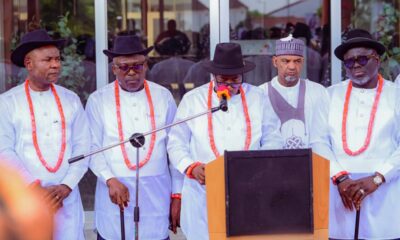News
Nigeria, Others May Lose $10bn To Political Tensions – IMF
The International Monetary Fund has said Nigeria could lose an estimated $10bn of foreign direct investment and official development assistance inflows to geo-political tensions.
The IMF in its country focus on Sub-Saharan Africa, released on Monday, said the figure is about a half per cent of the nation’s annual Gross Domestic Product.
The Washington-based lender said, “The losses could be compounded if capital flows between trade blocs were cut-off because of geo-political tensions. The region could lose an estimated $10bn of foreign direct investments and official development assistance inflow is about half a percent of GDP a year based on an average 2017–19 estimate). The reduction in FDI, in the long run, could also hinder much-needed technology transfer.”
IMF further said that if geopolitical tensions were to escalate, countries could be hit by higher import prices or even lose access to key export markets.
It added that about half of Sub-Saharan Africa’s value of global trade could be impacted.
The Washington-based lender also said that Sub-Saharan Africa could stand to lose the most if the world split into two isolated trading blocs centered on China or the United States and the European Union.
The IMF added the region’s economy could experience a permanent decline of up to four percent of its gross domestic product after 10 years.
“Sub-Saharan Africa could stand to lose the most if the world were to split into two isolated trading blocs centered around China or the United States and the European Union. In this severe scenario, sub-Saharan African economies could experience a permanent decline of up to four per cent of the real Gross Domestic Product after 10 years. According to our estimates, these are losses larger than what most countries experienced during the global financial crisis.”
According to IMF, economic and trade alliances with new economic partners, predominantly China, have benefited the region.
According to the report, economic trade alliances have also made countries reliant on imports of food and energy more susceptible to global shocks, including disruptions from the surge in trade restrictions following Russia’s invasion of Ukraine.
It added, “For countries looking to restructure their debt, deepening geo-economic fragmen¬tation could also worsen coordination problems among creditors. The region would fare better if only the US/EU cut ties with Russia and sub-Saharan African countries continue to trade freely. In this scenario trade flows would be diverted towards the rest of the world, creating opportunities for new partnerships, and possibly boosting intra-regional trade.”
However, IMF said that because some African countries benefit from access to new export markets and cheaper imports, the region would not incur a GDP loss.
It added that oil exporters supplying energy to Europe could even gain. IMF called for strengthening the African Continental Free Trade Area to better manage these shocks properly.
It added, “To better manage shocks, countries need to build resilience. This can be done by strengthening the ongoing regional trade integration under the African Continental Free Trade Area, which will require reducing tariff and non-tariff trade barriers, strengthening efficiency in customs, leveraging digitalization, and closing the infrastructure gaps. Deepening domestic financial markets can also broaden sources of financing and lower the volatility associated with relying too much on foreign inflows. To take advantage of the potential shifts in trade and FDI flows, countries in the region can try to identify and nurture sectors that may benefit from trade diversion like energy. Commodity exporters in the region could potentially displace much of Russia’s energy market share in Europe.”
IMF advised countries in the region to rely on trade promotion agencies to help identify potential opportunities and build the necessary skills and capacity for exports.
“Countries can also rely on trade promotion agencies to help identify potential opportunities, build the necessary skills and capacity for exports, and eventually re-orient production to take advantage of new trade flows. Improving the business environment by lowering entry, regulatory, and tax barriers could also help. What the exact outcomes will be from fragmentation and polarization, and whether these trends will continue are uncertain. What is clear, however, are multilateral institutions will need to continue to facilitate dialogue among nations to promote economic integration and cooperation.”
News
Fubara Attends PDPGF Meeting In Asaba …..Back Court Verdict On National Secretary Position

Rivers State Governor, Sir Siminalayi Fubara, last Friday, attended the Peoples Democratic Party Governors’ Forum (PDP-GF) meeting in Asaba, the Delta State capital.
The Rivers State Governor, who is the Vice Chairman of the PDP Governors’ Forum, attended the meeting, alongside 10 other Governors of the party’s controlled states across the six geopolitical zones of the country.
The first PDPGF meeting in 2025, was held at the Government House in Asaba, at the end of which a seven-point resolution was reached.
Reading the communique at the end of the meeting, the Chairman of the Forum, and Governor of Bauchi State, Senator Bala Mohammed urged the National Working Committee (NWC) to put every machinery in place to ensure a hitch-free NEC meeting on March 13, 2025.
The communique stated:
“The Forum, having examined all the notices required by law to be given to validly convoke NEC, advised NWC to reschedule NEC to the thirteenth (13Th) of March 2025.”
The Forum further noted the Court of Appeal judgment affirming Udeh Okoye as the National Secretary of the party, saying that as a party that believes in the rule of law, it will respect the position of the Appellate Court on the matter.
“The Forum noted with delight the ongoing efforts at resolving the crisis in the National Working Committee, NWC, on the position of the National Secretary, and has reaffirmed its support for the Court of Appeal judgment; consequently, the Forum advised the NWC to set up the machinery for the effective implementation of the court judgment.
“While commending the country’s valiant and patriotic Armed Forces and Security Agencies for maintaining the frontline in securing the country and the gains of our gallant personnel against bandits in parts of the country, the Forum viewed with deep concern, the resurgence of brazen non-state actors. It, therefore, calls for the strengthening of the nation’s security architecture.”
Governors in attendance include: H.E Senator Bala Abdulkadir Mohammed (Bauchi State); H.E Sir Siminalayi Fubara (Rivers State) – Vice Chairman; H.E Rt. Hon. Sheriff Oborevwori (Delta State) – Host; H.E Dr. Agbu Kefas (Taraba State); H.E Rt. Hon. Ahmadu Umaru Fintiri (Adamawa State); and H.E Dr. Dauda Lawal (Zamfara State).
Others are H.E Senator Ademola Adeleke (Osun State); H.E Senator Douye Diri (Bayelsa State); H.E Pastor Umo Eno Ph.D (Akwa Ibom State); H.E Dr. Peter Mbah (Enugu State); H.E Barr. Caleb Mutfwang (Plateau State);
and H.E Bayo Lawal (Deputy Governor, Oyo State), who represented Governor Seyi Makinde.
News
NGO Implants Free Pacemakers Into 22 Cardiac Patients In PH
A United States based Non Governmental Organisation, Cardiovascular Education Forum, in collaboration with the University of Port Harcourt Teaching Hospital (UPTH), has successfully implanted free pacemakers into 22 patients with different cardiac cases in Port Harcourt.
This is in a bid to save lives and encourage patients with low heartbeats to live longer.
The implantable device, which costs $20,000 each, was inserted free of charge on the selected patients.
Speaking during a Special Hospital Ground Rounds at the UPTH with its Theme, “Recent Advances in Cardiac Pacing,” a cardiac Physiologist, Dr Neil Grub, said the NGO was in Nigeria to improve training and learning on cardiac issues and help patients with cardiac problems.
Accompanied by a team of experts comprising a cardiologist and cardiac device implanter, Dr Jagdeep Siagh, and UPTH interventional cardiologist, Dr Edafe Emmanuel, Dr Grubb said pacemakers were inserted on patients with low heartbeats to boost their heart rates.
Earlier, the Chief Medical Director, UPTH, Prof Henry Arinze Ugboma, said each of the implantable devices cost over $20,000.
Ugboma, represented by the Chairman, Medical Advisory Committee, UPTH, Prof Datonye Alasia, said the partnership between UPTH and the foreign NGO was to build networks, and improve services in terms of healthcare delivery, training and learning.
According to him, there is now a ray of hope in terms of treatment of patients with cardiovascular cases in the hospital.
He said the UPTH started the collaboration with Cardiovascular Education Forum in 2018 to boost health, training and learning on cardiac health.
He assured that, “in coming years, the scale of our collaboration with the mission will be higher.”
Chinedu Wosu
News
FG Unveils National Broadband Alliance To Drive Internet Access
The Federal Government has unveiled the National Broadband Alliance, a new initiative aimed at transforming the nation’s digital infrastructure and boosting connectivity across the country.
The initiative was unveiled yesterday in Lagos by the Minister of Communications, Innovation, and Digital Economy, Bosun Tijani, who was represented by the Executive Vice Chairman of the Nigerian Communications Commission, Aminu Maida.
In his address, Tijani stated that NBAN would significantly enhance broadband penetration, which has grown from just six per cent in 2015 to approximately 42 per cent as of October 2024.
To support this agenda, he said the government was leveraging a Special Purpose Vehicle to deploy 90,000 km of fibre backbone across the nation, connecting underserved and rural communities to high-speed internet.
According to him, the initiative aligns with the Renewed Hope Agenda of President Bola Ahmed Tinubu, which prioritises innovation, technology, and collaboration as key drivers of national prosperity.
Tijani stated that the expansion would not only improve access to reliable broadband but also empower Nigerians, particularly in rural areas.
“While the progress made in broadband penetration is commendable, we recognise that much more needs to be done to ensure every Nigerian can enjoy the benefits of reliable, high-speed internet,” Tijani said.
The minister also emphasised the importance of strategic partnerships with donors, investors, and other key stakeholders in achieving the goals set out in the National Broadband Plan (2020–2025).
He said these collaborations would be essential in overcoming infrastructure development challenges and making broadband affordable and accessible for all Nigerians.
“These targets reflect our unwavering commitment to ensuring that broadband is accessible, affordable, and inclusive for all Nigerians. However, we are also aware of the challenges ahead,” he added.
Tijani stressed that achieving the government’s targets—70 per cent broadband penetration by 2025, a minimum internet speed of 25 Mbps in urban areas, and broadband access for 80 per cent of the population by 2027—will require sustained efforts.
“Achieving these goals will require more than just the efforts of the private sector. It will require a holistic approach that includes strategic partnerships with donors, investors, and other key stakeholders in accelerating the rollout of critical infrastructure,” he said.
-
Business17 hours ago
Oil Production Resumption: Ogoni Youths Seek Inclusion In FG’s Plans
-

 News19 hours ago
News19 hours agoSenate Reshuffles Committees, Appoints New Chairmen For Dev Commissions
-

 Nation16 hours ago
Nation16 hours agoBizman Alleges Threat To Life …Seeks Police , Govt’s Intervention
-
Rivers17 hours ago
NOSDRA D-G Disburses N150m To 300 Farmers In Rivers
-

 Niger Delta15 hours ago
Niger Delta15 hours agoOgoni Postgraduate Forum Tasks HYPREP On Scholarship Scheme
-
Business17 hours ago
NCDMB Assures Greater Local Industry Participation In Oil, Gas Projects
-

 News19 hours ago
News19 hours agoNigeria Strengthens Economic Ties With Germany To Boost Investment, Jobs
-

 Featured16 hours ago
Featured16 hours agoFubara Flags Off Upgrading Of 135 Primary Healthcare Facilities In Rivers

